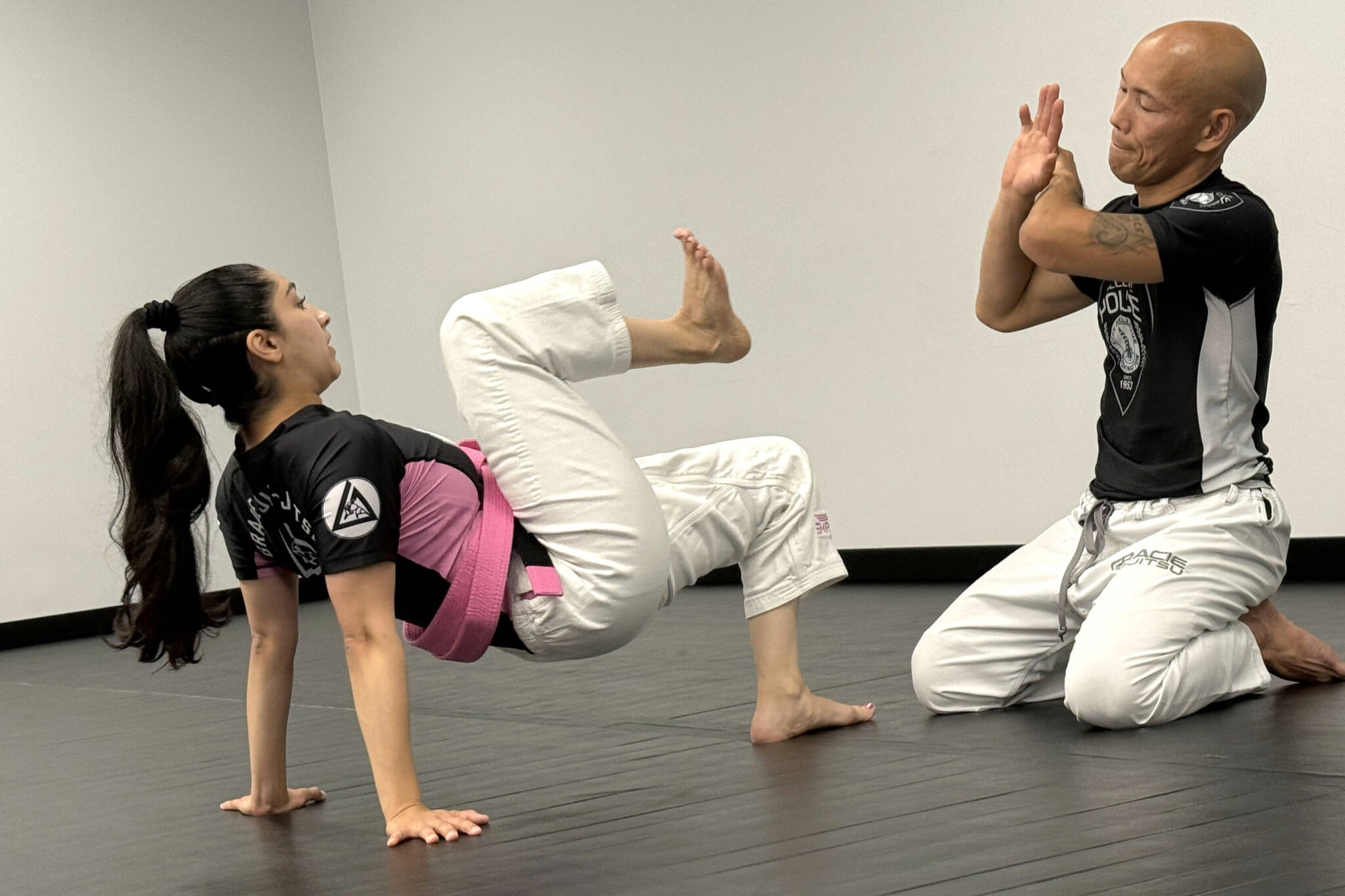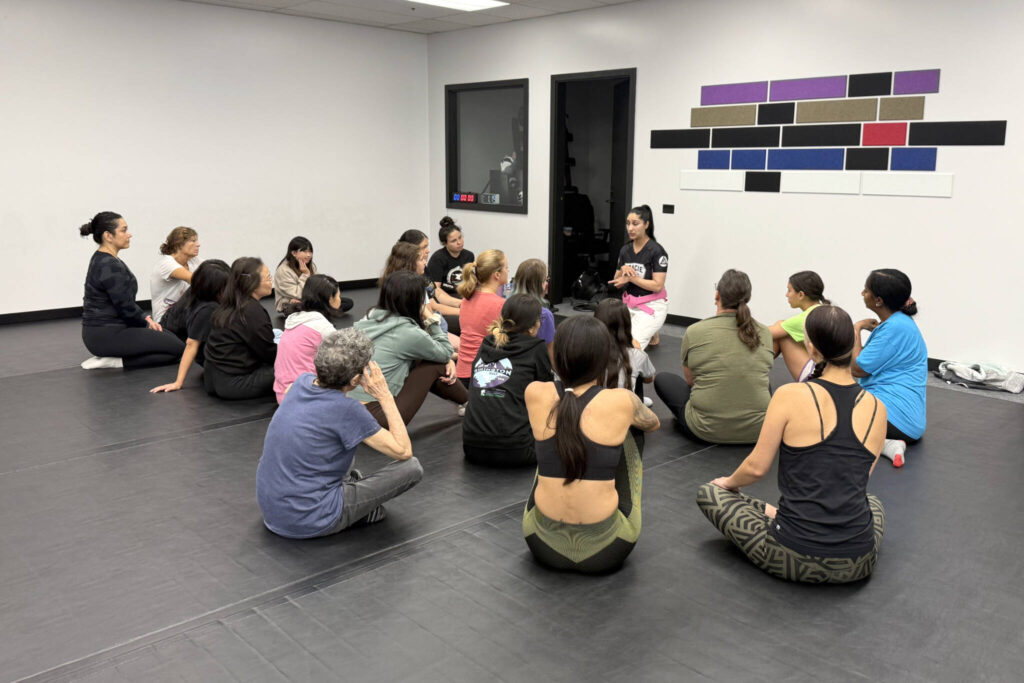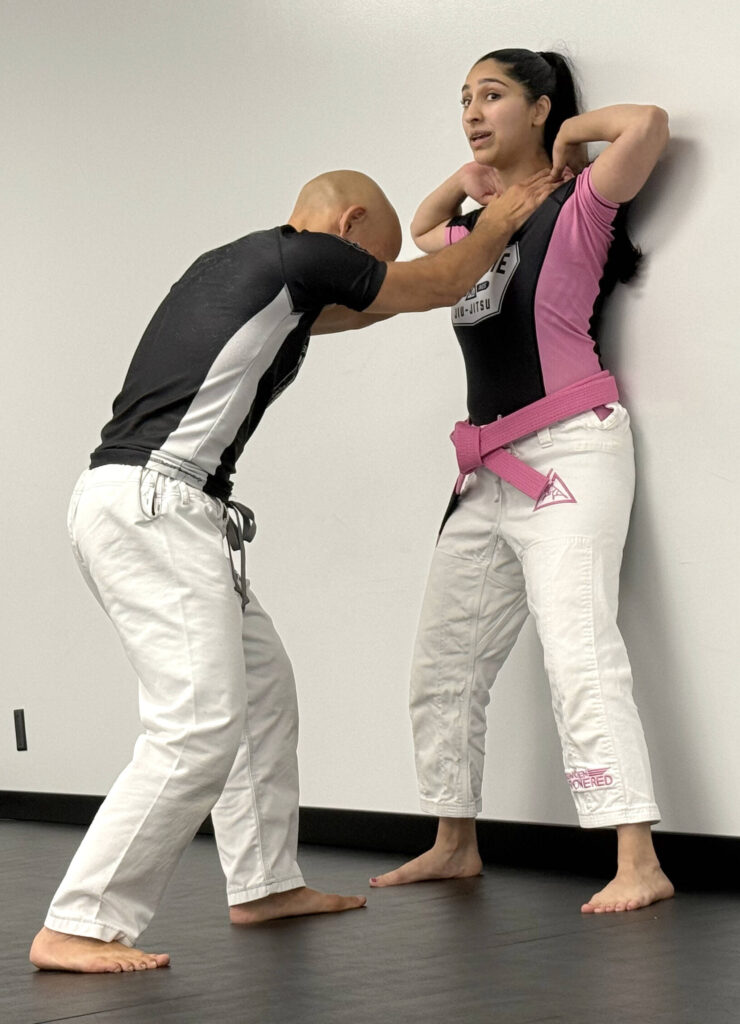EVERETT — More than 30 women, from mother-daughter duos to seniors, streamed into PandaRoll JiuJitsu on Oct. 4.
For many attendees, including myself, that Saturday afternoon was our first self-defense class.
Hosted by the Lynnwood Police Department, the Women Empowered program is a biweekly two-hour class that focuses on different techniques each session. The class is free, and participants can attend at their convenience by signing up online.
“The Women Empowered program is based off the 20 most common physical threat scenarios against women,” said class instructor and Lynnwood Officer Maryam McDonald. “We’ve created 20 techniques that cover each one of those most common physical threat scenarios, and we’ve divided it into 15 different lessons.”
‘A whole broad, scalable spectrum of options’
The curriculum comes from Gracie University, a global Brazilian Jiu-Jitsu academy. It aims to teach women skills to neutralize attacks from a larger opponent regardless of age or athletic ability. Once McDonald completes all 15 classes, the classes will cycle back through, she said.
“When I was working patrol, I would respond to a lot of domestic violence calls,” McDonald said. “I would speak to the survivors and hear a lot along the same lines of, ‘I don’t know what else to do. They were much bigger, heavier, stronger than me, and I had no other option.’ And being a jiu-jitsu practitioner, that just broke my heart because I know there’s so much more you can do, especially being a smaller female.”
McDonald’s jiu-jitsu journey began when she was 15 years old. As a smaller person, techniques focusing on leverage and timing are what made her fall in love with the sport, she said.
McDonald wanted to do something to change what she heard in the field, so she got involved with the Women Empowered program hosted by the Bellevue Police Department, she said. Eventually, she got certified to teach and began instructing classes in Lynnwood.
On Aug. 23, McDonald’s first class took place at PandaRoll JiuJitsu. For the studio’s co-founder, Ken Leif, the Women Empowered program helped him meet his goal of helping the community with his practice, he said.
The class combines non-strength-based tactics with psychological strategies to defend yourself against a range of perpetrators during the four phases of assault. The first phase is when a perpetrator identifies an unsuspecting target. While the class discusses strategies to avoid becoming an “ideal target,” McDonald said individuals have a right not to be vigilant at all times.
“You are going to be vulnerable in some positions, but we just have those discussions of how we can avoid that,” McDonald said.
Phase two is where a perpetrator subdues and isolates a target. This is where self-defense strategies, like screaming for help and bystander intervention, may be beneficial, she said. In phase three, the perpetrator attempts to control and exhaust. In this phase, it is better to conserve your energy until you can use one of the self-defense techniques. In the last phase, the assault is carried out.
“Another technique that we talk about is the false surrender, and that’s if the technique that we’ve recommended for this position maybe isn’t effective,” McDonald said. “You say, ‘I give up. Please don’t hurt me. I’ll do whatever you say.’ And you don’t have any movement in your body. And then they may let go of whatever they were holding to create that opportunity for you to escape.”
Almost three out of four sexual assaults are committed by someone the victim knows, according to the Elizabeth Freeman Center, which provides services to survivors of domestic and sexual violence.
“A lot of the time when it’s somebody you know, you’re not really willing to resort to strategies that you might if it’s a stranger,” McDonald said. “We like to offer a whole broad, scalable spectrum of options that uses no strength or power, all just leverage, timing, technique.”
‘You’re going there for the community’
At 1 p.m. on Oct. 4, McDonald, alongside Bellevue Officer Craig Hanaumi, walked attendees through front choke defenses and guard get-ups, which focused on phases three and four of assault. Both scenarios included a standard and a modified version to account for various situations women may find themselves in.
Before the class, I admitted to McDonald that I had never practiced jiu-jitsu. She smiled, assuring me this was beginner-friendly. Moments later, I found myself on the mat learning the importance of good form and a strong base.
Despite the heavy topic, McDonald and Hanaumi kept the mood light with jokes and audience participation. Even in practice scenarios, McDonald encouraged women to advocate for how they wanted to be touched.
“The whole point of this class is to be empowered,” she told attendees.
After each demonstration, participants partnered up and got a chance to practice the technique under the watchful eye of both officers and the PandaRoll JiuJitsu staff.
While I felt like a fish out of water, my partner, a woman in her late 20s, had attended a self-defense class before. While other classes focused on demonstrations and somber statistics, Women Empowered had a more hands-on approach, which she appreciated, she told me as we practiced our fake kicks.
While I won’t be graduating from a white belt anytime soon, I did feel safer walking to my car.
“Some people have never experienced anything that was like a dangerous situation. They just like knowing what to do if that ever happens, and some people who have, it’s helped them heal from it,” McDonald said. “So even if you don’t feel like you need it, at least you’re going there for the community and just making new friendships.”
The next class takes place at 1 p.m. on Oct. 18 and focuses on inverted wrist releases and two different variations of the guard get-up based on phases two and three of assault. Individuals can sign up for this or other dates at https://pandarolljiujitsu.com/community and email mmcdonald@lynnwoodwa.gov with any questions.
“The feedback from everybody saying that this has made a difference in their life, and that they do feel safer, that’s the most fulfilling,” McDonald said. “That’s what I want out of it, to make a difference and maybe help save a life one day.”
Jenna Millikan: 425-339-3035; jenna.millikan@heraldnet.com; X: @JennaMillikan
Talk to us
> Give us your news tips.
> Send us a letter to the editor.
> More Herald contact information.



























